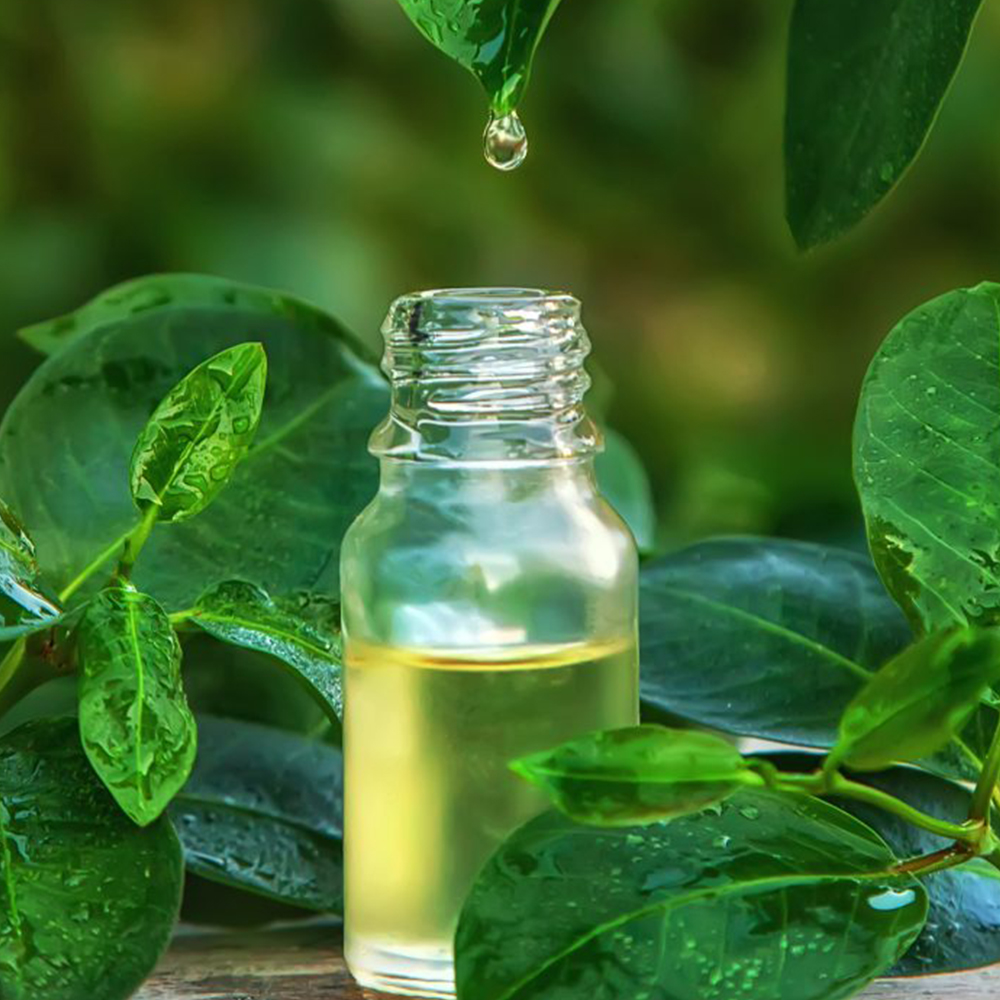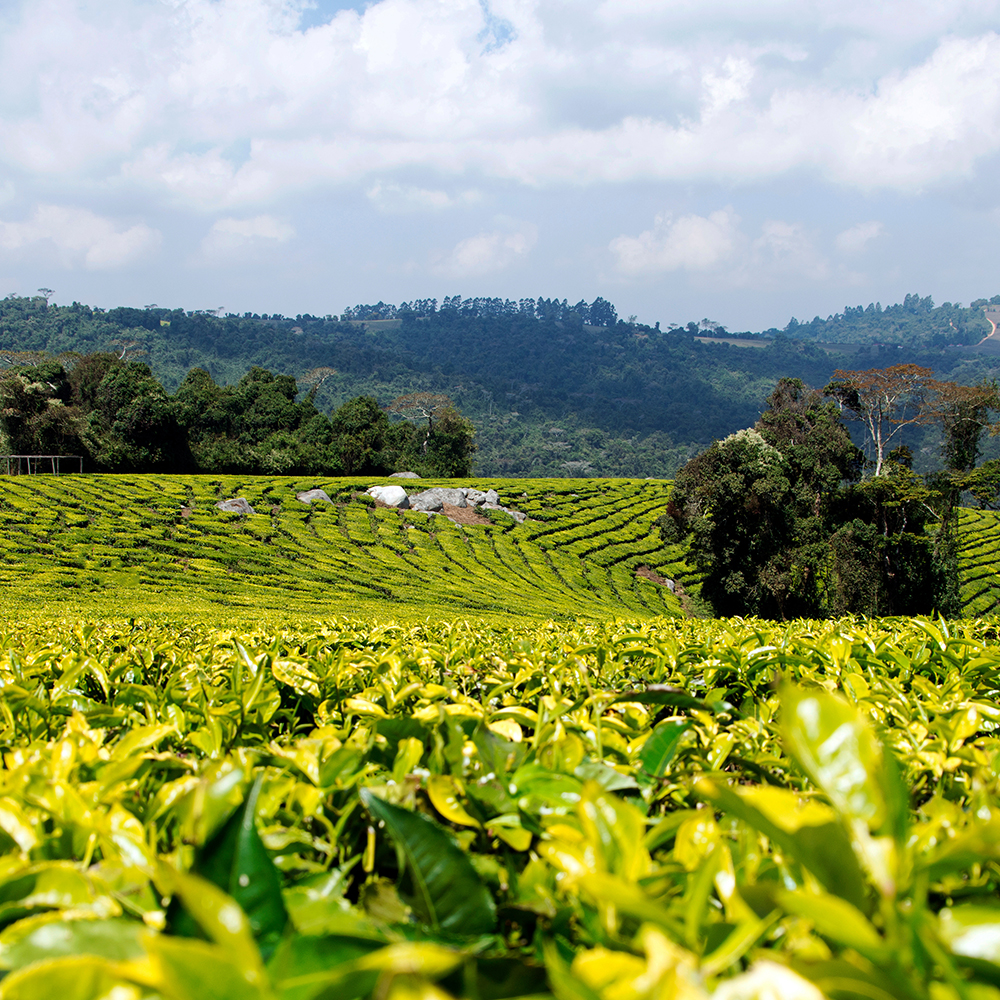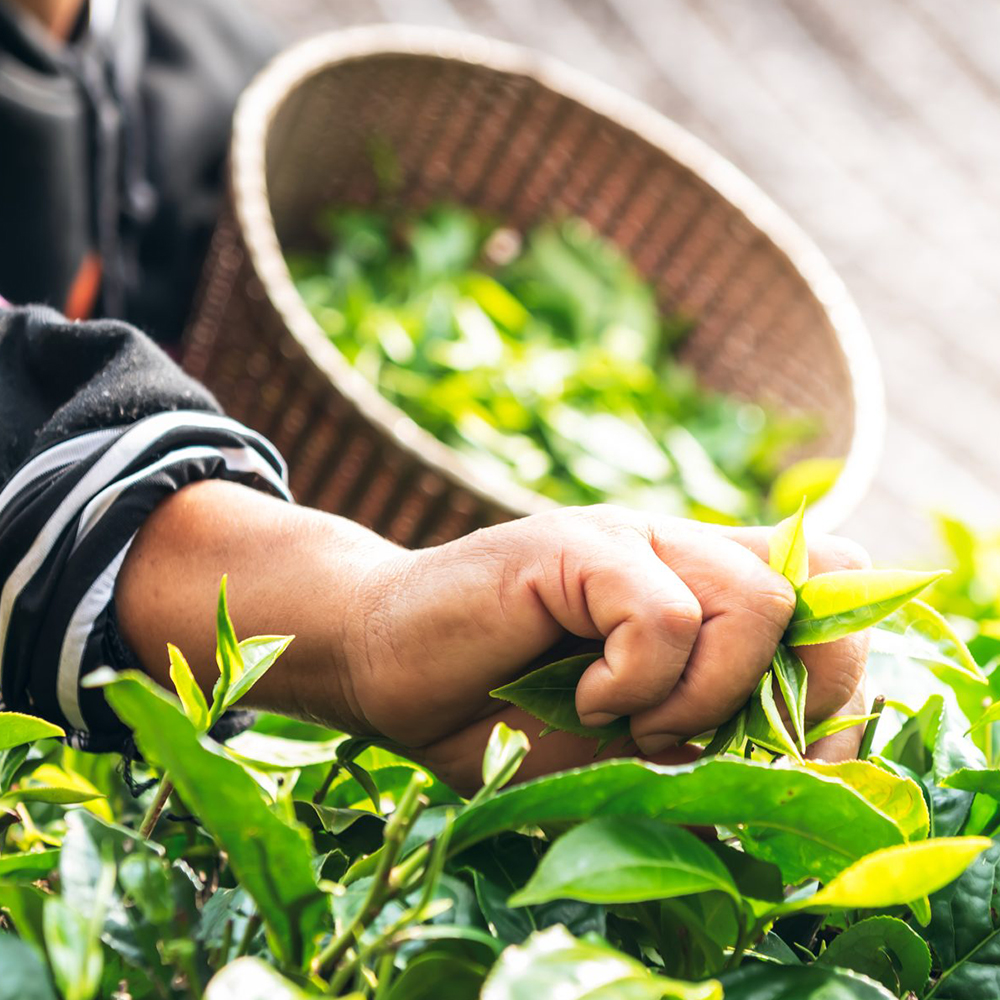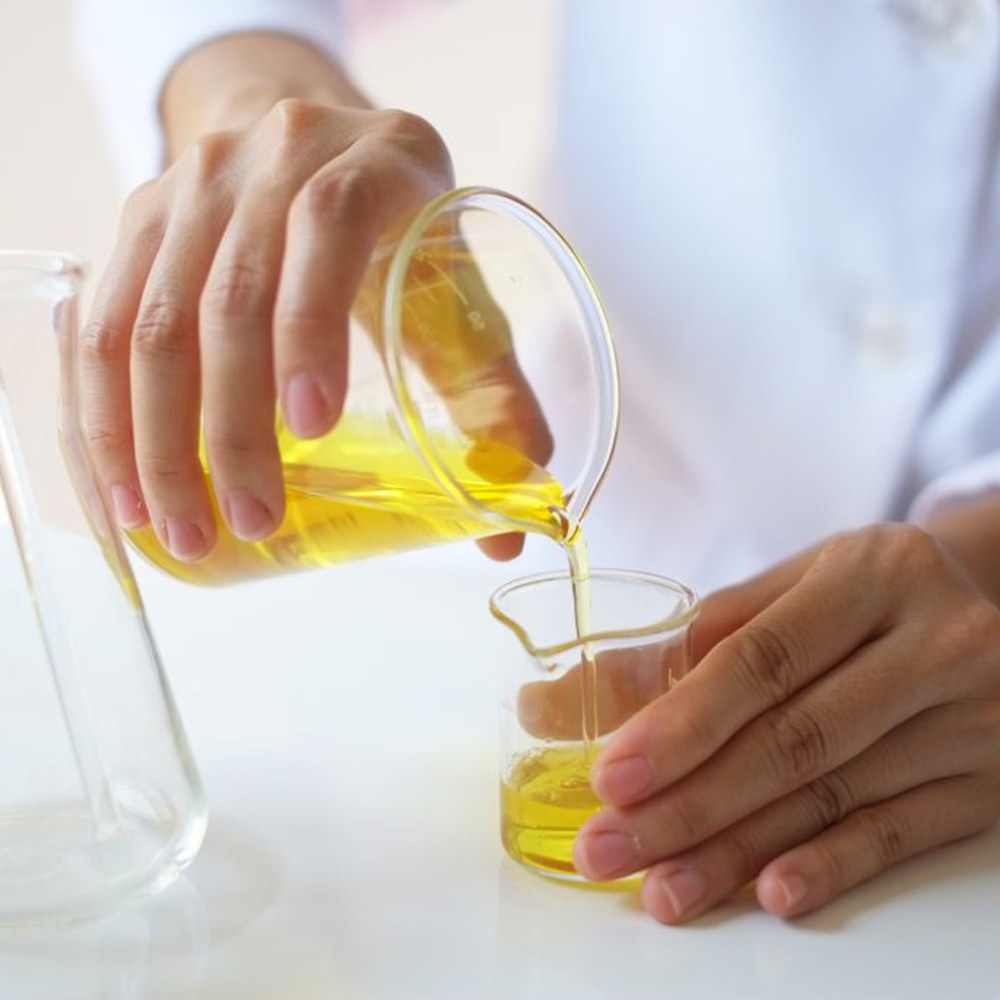Elevate Your Wellbeing with
Bulk Organic Tea Tree Oil
Where Does Tea Tree Oil Come From?
Tea tree oil comes from the leaves of the tea tree plant Melaleuca alternifolia, considered an evergreen tree or tall shrub. Its species grows up to around 20 feet and has a whitish papery bark. It has a bushy crown of alternately arranged and whorled leaves with a smooth, soft, and linear shape. It has a white or cream-colored mass of spiky flowers that bloom from spring to early summer and give the tree a fluffy appearance.
Tea tree is native to Australia, particularly along streams and swampy places in the southeastern parts of Queensland and the northeastern coast of New South Wales. Although it prefers moist and well-drained soils under full sun, it grows well in various soils and climates.
The indigenous Australians of the eastern inland regions used Melaleuca alternifolia as a traditional medicine. They crush the tea tree leaves to get their oils and use them to treat coughs and colds by inhaling them. They also sprinkle the leaves on wounds before applying a poultice. And they make an infusion from it for treating sore throats and skin ailments.
Tea tree oil can also be extracted from other Melaleuca tea tree species – M. armillaris, M. styphelioides, M. leucadendra, M. acuminata, M. ericifolia, M. quinquenervia, M. linariifolia, and M. dissitiflora. The tea tree oil these plants produce differs from lemon tea tree oil extracted from the lemon tea tree (Leptospermum Peterson). Scatters Oils only extracts its pure tea tree oil from the species Melaleuca alternifolia.
How Bulk Tea Tree Oil is Extracted?
Commercial extraction of essential oils is done in distillation and solvent extraction. Distillation is done with a medium such as water, steam, or a combination of both.
Tea tree oil is extracted by steam distilling the plant’s cut and mulched leaves and terminal branches. The extracted product with this method usually amounts to 1 to 2 percent of the wet plant material weight. Although it is possible to extract tea tree oil through water and solvent extraction, steam distillation is the most viable for commercial extraction.
Benefits of Tea Tree Oil
It kills common bacteria and viruses.
Tea tree oil has antimicrobial properties making it effective as a natural sanitizer against common bacteria and viruses like E. coli, S. pneumoniae, and H. influenzae. Adding tea tree oil to hand sanitizers and washes can boost their effectiveness against these bacteria and viruses. Unlike other antiseptics and disinfectants, it does not cause antibiotic resistance among germs.
Repels insects
Tea trees can be an effective insect repellent. It can keep flies, ants, and mosquitoes away from humans, animals, and agricultural produce. In some cases, it remains effective as an insect repellant after 24 hours of its application. And it has a more remarkable ability to repel mosquitoes than DEET (a common active ingredient in insect repellents), as one test-tube study has found.
Controls underarm odor
Sweat has no smell. But, when it comes in contact with the bacteria on the skin, these microorganisms metabolize the proteins, lipids, and steroids, which produce the unpleasant smell of body odor.
Tea tree oil can control the unpleasant odor caused by sweat thanks to its antibacterial effects. This makes it an excellent alternative ingredient in deodorants for those who would instead not use antiperspirants.
Disinfects minor cuts and abrasions
Germs can quickly enter your wound’s broken skin, leading to infection and prolonging its healing. Tea tree oil can disinfect minor cuts and scrapes by killing the bacteria that may cause an infection.
Encourages wound healing
Tea tree oil can help wounds heal faster. It does this by reducing inflammation and increasing white blood cell activity and blood flow in the area of the injury. The same effect has been observed even when wound healing has been delayed due to a health condition, such as chronic wounds caused by diabetes and prolonged bed confinement.
Fights acne
The antiseptic properties of tea trees work against the bacteria found in acne, Propionibacterium. It works just as well as benzoyl peroxide in reducing acne inflammation. However, tea tree oil does not irritate the skin much like benzoyl peroxide. This can help prevent and reduce acne scars and leave clearer skin when it heals.
Prevents and fights fungal nail infections
Tea tree oil can prevent and treat nail fungus when used undiluted by itself or mixed with other ingredients. And, unlike most antifungal treatments, it has little to no side effects on the user.
Fight tooth decay and bad breath.
Tea tree oil can fight germs that cause bad breath, tooth decay, and plaque build-up. It is also effective in reducing the inflammation caused by gingivitis. Oral health companies know these benefits, which is why they add tea tree oil to the ingredients of their mouthwash products.
Relieves skin inflammation
Tea tree oil can reduce the symptoms of the following skin conditions:
- Contact dermatitis – It is the most common form of skin irritation. It occurs when the skin is exposed to an allergen and becomes red, itchy, and painful.
- Inflammation from bug bites – Tea tree oil can reduce the itchiness, redness, and swelling caused by bug bites.
- Rosacea – Tea tree oil reduces the redness and inflammation caused by rosacea when applied as a gel.
- Demodex blepharitis – Tea tree oil can reduce Demodex mites and the inflammation they cause.
Restores the health and luster of hair
Tea tree oil promotes hair growth and strengthens hair bonds by nourishing the roots that it grows from. And, with well-nourished roots, the hair grows with a healthy luster.
Reduces dandruff
Dandruff is a skin condition that has several causes. This includes oily and irritated skin, dry skin and hair, Malassezia fungus, contact dermatitis, and poor hygiene. Tea tree oil’s moisturizing and antifungal effects can alleviate dandruff caused by skin dryness and irritation, contact dermatitis, and fungal infection.
It makes a great all-purpose cleaner.
Tea tree oil can sanitize surfaces thanks to its antimicrobial properties. It does not harm humans and pets as long as it is in low concentrations. As a result, it is an excellent active ingredient for those who need an all-purpose cleaner that does not leave harmful residues on surfaces.
Controls mold growth in produce
Fresh fruits and vegetables are susceptible to the growth of Botrytis cinerea in warm and moist climates. The gray mold causes decay, discoloration, and wilt on produce.
Tea tree oil can fight this mold thanks to its antifungal properties. According to studies, it does this by causing severe damage to the membrane and intracellular components of the fungi.
Relieves the symptoms of psoriasis
The autoimmune condition of psoriasis is characterized by red, itchy, and scaly skin. Medications can manage the symptoms. Unfortunately, the skin can develop tolerance to these medications and lessen their effectiveness.
Tea tree oil can ease inflammation and ward off infection on any broken skin due to scratching. However, tea tree oil can only be used as part of a mixture for this purpose, given that it can dry out the skin and make psoriasis worse.
It provides a refreshing scent.
Tea tree oil has a mighty and characteristic musky, pine-like scent. Using it in a diffuser can eliminate unpleasant indoor odors and maintain a pleasant smell for linens, wardrobes, and laundry. Also, the scent of tea tree oil has a soothing property to create a pleasant atmosphere.
Buy Organic Tea Tree Oil

The Importance of High-Quality Bulk Tea Tree Oil
Tea tree essential oil provides several benefits making it a popular essential oil. It is often used by itself or as an ingredient for various products and applications – including cosmetics, cleaning, personal care, laundry detergent, shampoos, facial washes, skin and nail treatments, and massage oils.
Because of the several ways it is used, there is a high demand for tea tree oil from businesses and end consumers. This led to the cultivation of Melaleuca alternifolia in areas outside of its native location. It also led essential oil producers to use other Melaleuca species to produce tea tree oil.
However, not all oils extracted from the tea tree species are the same quality. The ideal tea tree oil extract contains 30 to 40 percent terpinene-4-ol and less than 7 percent concentration of cineole. If terpinene-4-ol is any lower than 30 percent concentration, the tea tree oil extract is not as effective. On the other hand, if these go beyond the specified concentrations, they can be too strong and may harm the user.
And most important of all, how the tea tree plant is grown, harvested, and extracted affects the quality of the essential oil produced. This is why high-quality tea tree oils need to come from farmers that know the best methods for growing and harvesting tea trees and are extracted by producers who learn the best practices for distilling and preserving the essential oil.
Why Choose Scatters’ Bulk Tea Tree Oil
Here at Scatters Oils USA, we work closely with the farmers supplying the plant materials for our essential oil production, including those growing and harvesting the Melaleuca alternifolia we use to extract bulk tea tree oil. This close working relationship enables us to ensure that the plant materials we need produce high-quality wholesale organic essential oils and that they can supply us sustainably for the environment and their businesses, employees, and communities.
Moreover, Scatters’ bulk tea tree oil is certified organic by the USDA and the BCS Oko-Garantie. We also go the extra mile to have our products approved by the FDA to ensure our clients can safely use our essential oils, including our tea tree oil. Lastly, our essential oils are certified as Kosher and Halal. We maintain our certifications, so you can rest assured that the quality of tea tree oil stays consistent.
Why Our Clients Choose Scatters Oils USA
Essential Oils for Their Customers

Scatters Oils has been in the business of producing high-quality bulk essential oils since the early 90s. Ever since we have:
- Worked closely with our farmers to ensure we were only getting high-quality organic crops for essential oil extraction
- Partnered with universities and industry organizations to research and develop the best methods for farming, extracting, and storing essential oils
- Helped our farmers, essential oil extractors, and logistics adapt to the best methods for their business
- Followed HACCP and FDA-approved practices to ensure product quality, potency, and safety
- Ensured sustainable farming to minimize, if not eliminate, any negative impact on the environment and to preserve the plant species of our crops, such as the Melaleuca alternifolia we use for extracting our bulk tea tree oil
- Implemented ethical and sustainable business practices so our farmers, their employees, and their communities grow and profit
- All of these ensure that our customers get high-quality and sustainable products that they can offer to their customers or use as ingredients in their products whenever they buy our tea tree oils in bulk.
Whether you need a supplier for retailing wholesale tea tree oil, manufacturing products, or providing services for your customers, Scatters Oils’ bulk tea tree oil is your best choice!
For those eager to delve into the world of essential oils, explore the numerous benefits of ravintsara essential oil.
Buy Bulk Tea Tree Oil from Scatters Oils
Scatters Oils’ quality for organic tea tree essential oil is different. Order your tea tree oil in bulk today, or contact us to receive more information on how to create a custom order.
Shop Wholesale Tea Tree Oil



